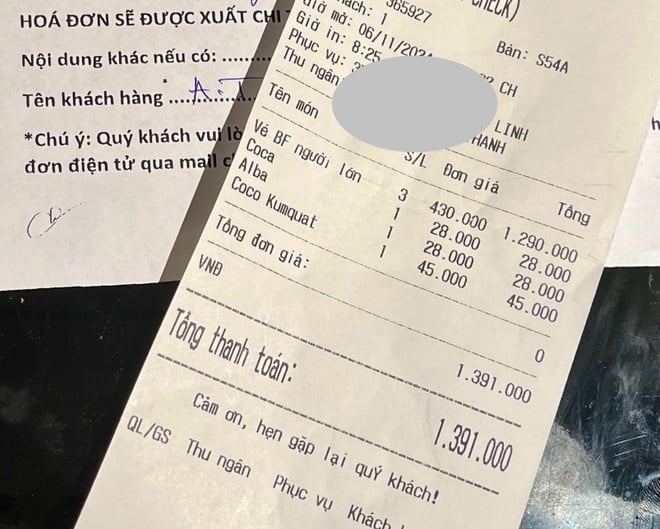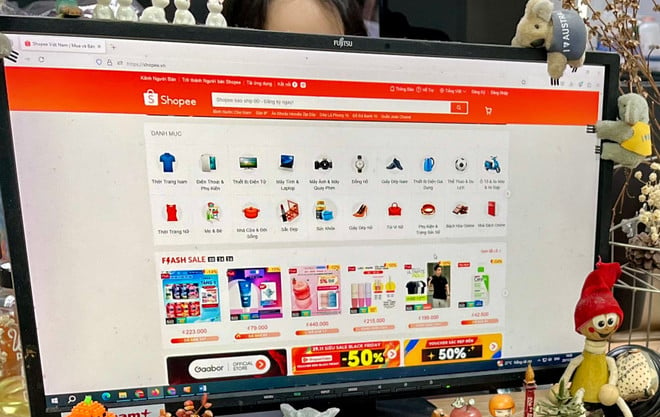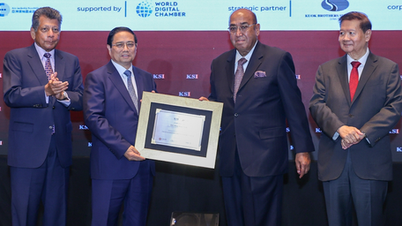Consumers' easygoing nature leads to acceptance of buying counterfeit, fake, and poor quality goods. (Photo: Vietnam+)
In the context of strong digital transformation, e-invoices are considered an important step in modernizing the tax sector, towards economic transparency and protecting consumer rights.
However, the reality shows that although it has been widely deployed, electronic invoices have not really penetrated the “blood vessels” of social life. Because the majority of people are still “indifferent” to getting invoices after purchasing goods.
This "indifference" not only causes consumers to ignore their legitimate rights but also unintentionally "contributes" to the loss of state budget revenue, creating an unhealthy business environment.
The habit of "buy fast, pay soon"
"If there is no need to deduct corporate income tax, most consumers do not have the habit of receiving electronic invoices, especially in the retail, food and service sectors," said a tax expert.
Reporters from VietnamPus Electronic Newspaper quickly surveyed a number of consumers and noted that they did not have the habit of asking for electronic invoices. Ms. Nguyen Mai Huong ( Hanoi ) said the reason for not taking invoices: "It takes a lot of time. For example, when buying gasoline, to get an invoice, you have to go to the counter to provide information, while getting an invoice is not necessary." She added that at some restaurants, when asked to issue an invoice, the staff also informed her that she would have to pay an additional fee equivalent to a percentage of value added tax, which made her feel it was costly.
Specifically, Ms. Huong works in the office and often orders restaurants and is responsible for paying when the agency organizes parties outside. She said that stores will usually issue invoices if requested. There are 3 types of restaurants, one is proactive in calculating value-added tax in the selling price and when there is a request for an invoice, just provide the tax code, they will issue it. In the second case, the store said that it does not calculate tax in the selling price, if the customer requests an electronic invoice, they will have to pay additional value-added tax. In the third case, the store informed that it is always an establishment that does not have a value-added invoice.
Restaurants proactively calculate value-added tax into the selling price and when there is a request for an invoice, they only need to provide the tax code and they will issue it. (Photo: Vietnam+)
Ms. Huong's comments reflect the fact that many consumers are still not fully aware of the benefits of getting electronic invoices or find it inconvenient and costly to do so. Therefore, many people still maintain the habit of "buying quickly, paying in full," and are indifferent to getting invoices, thereby unintentionally ignoring their legitimate rights and contributing to risks in tax management.
In addition, Ms. Pham Thi Tuyet, a chief accountant at an agency, confided: "When buying goods on e-commerce platforms for a few hundred thousand, there is no need to care about the invoice. If it is food, I really do not pay much attention to the quality and origin of the purchased products." In addition, Ms. Tuyet admitted that she usually only saves the money transfer statement without asking for the invoice. She also honestly shared that she often takes the invoice when buying high-value products, but ignores consumer products (such as food, cosmetics, etc.) even though she knows that there may be risks and direct impacts on health.
"Some retail companies have purchase orders, but the buyer must provide a tax code before they can provide an electronic invoice. Accordingly, these orders are essentially not legally valid when a problem occurs with the product. Consumers' leniency leads to the acceptance of buying counterfeit, fake, and poor quality goods," Ms. Tuyet admitted.
Ms. Pham Thanh Hong, a treasurer of a business and often orders online for colleagues, shared that when buying online, stores will require a video recording when opening, but when consumers forget, they have to take the risk. Or, when buying functional foods that are hand-carried, there is never an invoice, and it is not known whether the real and fake goods are mixed together.
Ms. Hong said: “Sellers often take photos of orders from overseas, but buyers cannot control whether their goods are in that shipment or not and obviously accept the risk. In my opinion, functional foods are purchased from acquaintances and people who are trusted to carry them in a guaranteed manner. Not taking invoices when buying goods and services for individuals is common (since the introduction of value-added tax), accountants have never had this habit," Ms. Hong added.
Significant consequences for the economy and society
According to experts, consumers' "indifference" to electronic invoices has caused significant consequences for the economy and society. The first is budget loss. Because this has helped businesses easily conceal revenue, evade taxes, causing the State to lose an important source of revenue to invest in public works and social security.
More regrettably, when consumers buy goods and services without invoices, they will have difficulty in complaining or warrantying products and services when problems arise. In addition, they also lose the opportunity to participate in promotional programs, accumulate points, and exchange gifts for customers with invoices.
For society, the fact that consumers “calmly” buy goods without invoices has contributed to creating an unhealthy business environment. Because tax-evading businesses have an unfair competitive advantage over law-abiding businesses, this affects the sustainable development of the market.
The fact that consumers “calmly” buy goods without receipts has contributed to creating an unhealthy business environment. (Photo: Vietnam+)
In addition, this “irresponsible” action also causes limitations in the development of the digital economy. Specifically, the lack of data on consumer behavior, because people do not receive invoices, will hinder the process of applying technology, analyzing the market, and making effective economic management decisions.
Ms. Le Thi Yen, Director of Hanoi Tax Consulting Company, affirmed that electronic invoices are a "shield" against counterfeit goods, a shield against tax losses. According to her: "Get electronic invoices - For real goods, for real businesses, for a fair and civilized Vietnam."
Specifically, Ms. Yen analyzed that in the era of digital technology and modern commerce, electronic invoices with authentication codes from the Tax Authority are not only accounting tools but also a strong shield to protect consumers and society against counterfeit, pirated goods, tax evasion, and even corruption. According to her, invoices always clearly state the place of supply, type of goods and services, which will help consumers know what they are buying, where and from whom.
On the other hand, electronic invoices also contribute to increasing accountability, Ms. Yen emphasized that when businesses know that customers request invoices, they will be forced to do business more transparently, reducing the risk of selling smuggled and poor quality goods. Moreover, invoices have a legal basis if there is a need for complaints, warranties, refunds or post-sales dispute resolution.
Getting a receipt should become a culture
The solution to make electronic invoices a part of consumer culture, Ms. Le Thi Yen said, requires the cooperation of the State, businesses and people. The first is to widely propagate by bringing the message "Getting invoices is a right and responsibility" into daily life, from schools, communities to society. Next, the Tax Authority should integrate to create convenience for stores, restaurants, supermarkets..., such as connecting electronic invoices with payment apps and sending invoices automatically via Zalo/email/SMS immediately after the transaction.
A practical incentive mentioned by Ms. Yen is the right to participate in the lottery program from electronic invoices organized by the Tax Department, having the opportunity to receive gifts and contributing to the community. However, she also affirmed that strict handling of businesses that violate the law by not issuing invoices must be done publicly to warn and serve as a deterrent.
In addition, Ms. Ngo Thi Lua, Director of an accounting and tax agency service company, said that consumers who get invoices have many advantages. For example, when an individual buys a television with an invoice request, if they do not use it later, they can sell it to an organization or business. Companies that buy those goods will have invoices to prove their origin and will be included in reasonable expenses.
Ms. Lua believes that when consumers ask sellers to issue invoices, they will have to have input documents, so they can be assured that the goods are genuine and know where the seller got them from. According to Ms. Lua, if a store refuses to issue invoices, this proves that the store cannot prove the origin of the goods.
Dr. Nguyen Ngoc Tu, tax expert, also emphasized the role of the State in creating incentive mechanisms and changing people's habits.
"Consumers think there's no point in not getting a bill, and even going to a restaurant and getting a bill means paying a percentage of value-added tax. This is more harmful than beneficial," said Mr. Tu.
The role of the State in creating incentive mechanisms and changing people's habits. (Photo: Vietnam+)
According to Mr. Tu, adding value added tax when customers request an invoice is a violation that needs to be condemned. Current regulations for businesses applying the value added tax deduction method require that the listed selling price include value added tax or clearly state that the price does not include tax. When selling goods or providing services, businesses are responsible for issuing full value added tax invoices, even if customers do not request them. Therefore, the situation of adding value added tax when customers request an invoice is a manifestation of tax fraud (including evasion of value added tax, corporate income tax, personal income tax), because this additional revenue is not recorded in the accounting books and reduces taxable income.
Sharing about the method of shifting from "management" to "service" thinking, Mr. Le Ngoc Huy - Head of the Department of Personal Tax, Business Households and Other Revenues, Tax Branch Region I - Tax Department, added that the industry is implementing many conferences to discuss policies, propagate and communicate contents, typical examples as well as reflect on illegal tax violations. Mr. Huy emphasized that invoices are a factor that affirms and proves the origin of goods.
In addition, Ms. Pham Tuyet, Director of Vietnam Accounting Solutions Consulting Company, also said that if a business "forgets" to issue an electronic invoice when selling goods/providing services, the Tax Authority will impose a fine. The fine if it does not affect the tax amount in the period is about 4 million VND/paper, if it affects the tax payable, it is about 6-8 million VND/paper. She noted that businesses/business households need to have a firm grasp of the regulations on electronic invoices to avoid mistakes.
Source: https://baobinhphuoc.com.vn/news/4/172089/tho-o-voi-hoa-don-dien-tu-danh-mat-quyen-loi-va-lam-that-thu-tax







![[Photo] Welcoming ceremony for Prime Minister Pham Minh Chinh and his wife on an official visit to Malaysia](https://vphoto.vietnam.vn/thumb/1200x675/vietnam/resource/IMAGE/2025/5/25/dc30203c3ae24da3990266ec3b29bb2d)
![[PHOTO] Hanoi fences off demolition of "Shark Jaws" building](https://vphoto.vietnam.vn/thumb/1200x675/vietnam/resource/IMAGE/2025/5/25/1b42fe53b9574eb88f9eafd9642b5b45)
![[Photo] Ea Yieng commune settlement project abandoned](https://vphoto.vietnam.vn/thumb/1200x675/vietnam/resource/IMAGE/2025/5/25/57a8177361c24ee9885b5de1b9990b0e)
![[Photo] Funeral of former President Tran Duc Luong in Quang Ngai](https://vphoto.vietnam.vn/thumb/1200x675/vietnam/resource/IMAGE/2025/5/25/ccf19a3d8ea7450bb9afe81731b80995)
![[Photo] French President Emmanuel Macron and his wife begin state visit to Vietnam](https://vphoto.vietnam.vn/thumb/1200x675/vietnam/resource/IMAGE/2025/5/25/03b59c7613144a35ba0f241ded642a59)


















































































Comment (0)